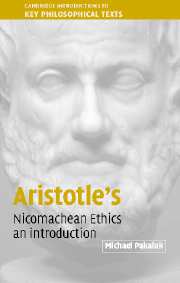Book contents
- Frontmatter
- Contents
- Preface
- 1 Reading Aristotle's Nicomachean Ethics
- 2 The goal of human life (Nicomachean Ethics, book 1)
- 3 Character-related virtue (Nicomachean Ethics 1.13 and book 2)
- 4 Actions as signs of character (Nicomachean Ethics 3.1–5)
- 5 Some particular character-related virtues (Nicomachean Ethics 3.6–4.9)
- 6 Justice as a character-related virtue (Nicomachean Ethics, book 5)
- 7 Thinking-related virtue (Nicomachean Ethics, book 6)
- 8 Akrasia, or failure of self-control (Nicomachean Ethics 7.1–10)
- 9 Friendship (Nicomachean Ethics, books 8 and 9)
- 10 Pleasure (Nicomachean Ethics 7.11–14 and 10.1–5)
- 11 Happiness (Nicomachean Ethics 10.6–9)
- References
- Index
7 - Thinking-related virtue (Nicomachean Ethics, book 6)
Published online by Cambridge University Press: 05 June 2012
- Frontmatter
- Contents
- Preface
- 1 Reading Aristotle's Nicomachean Ethics
- 2 The goal of human life (Nicomachean Ethics, book 1)
- 3 Character-related virtue (Nicomachean Ethics 1.13 and book 2)
- 4 Actions as signs of character (Nicomachean Ethics 3.1–5)
- 5 Some particular character-related virtues (Nicomachean Ethics 3.6–4.9)
- 6 Justice as a character-related virtue (Nicomachean Ethics, book 5)
- 7 Thinking-related virtue (Nicomachean Ethics, book 6)
- 8 Akrasia, or failure of self-control (Nicomachean Ethics 7.1–10)
- 9 Friendship (Nicomachean Ethics, books 8 and 9)
- 10 Pleasure (Nicomachean Ethics 7.11–14 and 10.1–5)
- 11 Happiness (Nicomachean Ethics 10.6–9)
- References
- Index
Summary
Let us recapitulate Aristotle's argument once more. He is looking to identify the ultimate goal of human life, which he conceives of as some activity, regularly repeated, which appropriately serves to organize everything else that we do, and which has the marks of Ultimacy, Self-Sufficiency, and Preferability. He argued in the Function Argument of book 1 that activity like that will be something that only a good human being can do, that is, it is activity that can be accomplished only by someone who has the “virtue” of a human being. Thus he turned in book 2 to an examination of human virtue.
But human virtue turns out to be complex; it admits of analysis; it has various “parts.” One such “part,” related to character, makes someone good at following or carrying out what he reasonably thinks he should do. It does this, Aristotle claimed, in two ways: by maintaining a person's motives in a condition of responsiveness falling between irrational and excessive extremes, and by assisting a person in crafting his action with refinement, so that it is appropriate as regards all of the various dimensions of an action. All stable conditions by which we become like this are particular character-related virtues, and Aristotle regards these as including courage, self-mastery, generosity, particular justice, and a handful of other good traits.
- Type
- Chapter
- Information
- Aristotle's Nicomachean EthicsAn Introduction, pp. 206 - 232Publisher: Cambridge University PressPrint publication year: 2005

